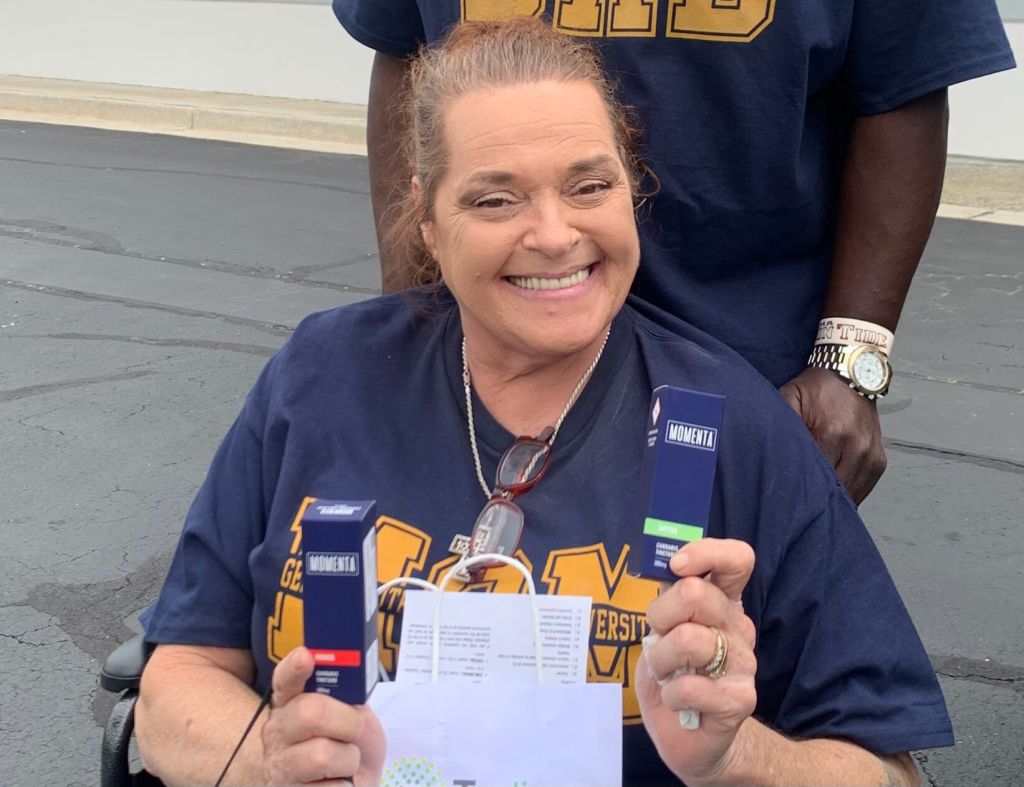DEA warns against Georgia pharmacies selling medical cannabis
Published 2:30 pm Thursday, December 14, 2023

- Michelle Alligood, pictured, and her husband traveled 100 miles from Fitzgerald to the Macon medical marijuana dispensary April 29. She is pictured with her tincture cannabis purchase.
ATLANTA — Access to medical cannabis in Georgia is hitting roadblocks as plans for pharmacies to dispense the medication appear to be halted.
In early October, the Georgia Board of Pharmacy began accepting applications from pharmacies around the state interested in selling medical cannabis products from licensed facilities. Georgia is the first state to allow pharmacies to act as medical cannabis dispensaries.
Trending
“Currently, there are 23 licensed pharmacists who are a critical part of ensuring access to patients, particularly in rural areas,” said Andrew Turnage, executive director of the Georgia Access to Medical Cannabis Commission. “Pharmacists also strengthen the medical program through patient consultation in the safe dispensing of medicines.”
However, a Nov. 27 letter from the federal Drug Enforcement Administration (DEA) to Georgia pharmacies indicated that their selling of medical cannabis products violates federal law.
Since medical cannabis products made in Georgia can contain up to 5 percent THC, which is derived from marijuana — a Schedule I controlled substance — pharmacies aren’t allowed to dispense it, according to the DEA.
“A DEA-registered pharmacy may only dispense controlled substances in Schedules II-IV of the Controlled Substances Act,” Matthew Strait of the DEA’s Diversion Control Division, said in the letter. “Neither marijuana nor THC can lawfully be possessed, handled or dispensed by any DEA-registered pharmacy.”
Under federal law, products derived from the cannabis plant with delta-9 THC content above 0.3 percent are considered marijuana, the DEA notices states.
Members of the GMCC — which just recently issued its last batch of medical cannabis licenses after two years of lawsuits — were concerned that the DEA rift would further hinder patient access since dispensaries are limited through the Hope Act, the 2019 enabling legislation for the state’s medical cannabis industry.
Trending
According to a map on GMCC’s website, there are currently nine functional medical cannabis dispensaries in Georgia, most of them in the northern half of the state. Two dispensaries are in the Savannah area, one each in Macon and Augusta, and the others are in Atlanta and its metro area.
Dispensaries are also subject to distance requirements at the local and state government level.
“They’re limited in number by the statute and therefore they’re not always within the immediate vicinity of where patients live,” Turnage said. “And there’s critical and severe conditions that may really be a challenge for patients because of their transportation limitations.”
Jansen Head, general counsel for the GMCC, said generally the Department of Justice — of which the DEA is affiliated — has generally focused its enforcement of marijuana laws on criminal networks involved in illicit trade.
She said while the intent of the DEA letter is unclear, the DOJ generally prevents the DEA from taking legal action against states in enacting medical marijuana laws.
“Whatever the intent was with the DEA letter, more than half of our access points for medical relief — which is the pharmacies — they’re impacted and at risk of no longer making this medicine available to patients as recommended by their physician,” Head said.
Commission member Bill Prather, a pharmacist himself, said he perceives the DEA letter as a threat to take away DEA permits from pharmacists who sell medical cannabis products. Pulling the permits would prevent pharmacies from selling any scheduled drugs.
Commission members at a Dec. 13 meeting appeared to support changing the drug classification of marijuana at the federal level, a topic debated for decades among state and national leaders.
The Food and Drug Administration and DEA define a Schedule I drug as a substance or chemical that has no accepted medical use and a high potential for abuse.
However, nearly 20 conditions and diseases qualify for medical cannabis in Georgia (and other states) including cancer, seizure disorders, sickle cell, post-traumatic stress disorder and Alzheimer’s disease.
Patients and caregivers of patients who believe they may be eligible for medical cannabis should consult with their physician about the possibility of obtaining a Low THC Oil Card, which allows for the purchase of non-smokable forms of medical cannabis such as tinctures, topical creams, tincture drops and capsules. The cards are administered by the Georgia Department of Public Health.
Access to the products at a pharmacy, Turnage said, would allow a patient with the Low THC Oil Card to consult with a pharmacist on which product would be best for their condition.
“There’s something really important about a licensed professional being between a regulated drug and a patient with a medical need,” he said. “Georgia has a national model for providing access to safe and laboratory-tested medicines through these independent pharmacies where patients can discuss their health care needs with medical professionals that they already know and that they trust.”
Jansen said the GMCC is working with other state agencies to determine the best way to move forward following the DEA notice.





